Anti-nuclear activists demonstrated at 23 locations across Germany on Saturday (12 February) against the imminent delivery of waste to a government-owned storage hall at Lubmin on the Baltic coast. The Northeast Anti-Nuclear Alliance reports at least 1,000 protesters in other locations and about 2,000 plus six tractors at Greifswald, the nearest larger town to Lubmin and former location of a nuclear power station.
The highly radioactive waste is to be railed in so-called CASTOR caskets hundreds of kilometres from a research centre at Karlsruhe, close to the French border in southwest Germany.
The train will carry five CASTORs containing 140 glass columns into which the waste has been fused. The government is the owner of the 60 cubic metres of waste, a solidified fluid of plutonium-uranium.
The alliance reports that the many actions along the route were colourful and creative and will peak on the actual shipment day.
“The day was a full success. We were able to show that the irresponsible atomic energy policy concerns the whole country and that there will be no more silent nuclear waste transports,” says Felix Leipold of the alliance (Anti-Atom Bündnis NordOst). “The mood was good on CASTOR Route Action Day from Karlsruhe to Greifswald.”
The CASTOR train is expected to depart Karlsruhe amid a night dance blockade in the night from Tuesday to Wednesday. Protests and blockades are expected along the entire route. Depending on the route chosen, the trip can be from 765 to 1,034 km long, 9 km of it on tram tracks through the middle of Karlsruhe city.
www.lubmin-nix-da.de
www.facebook.com/Lubmin.niXda
www.nachttanzblockade.de
presse-antiatom@systemausfall.org
Media phone: 0151 107 45 502 or 0160 463 44 53
Media lounge:
Jugendzentrum KLEX
Lange Strasse 14, Greifswald
200 in Erfurt
The Erfurt Anti-Nuclear Alliance comprising 19 organisations informed on the dangers of more CASTOR transports through Thuringia state. About 200 people demonstrated peacefully in the centre of town. “Production of nuclear waste must stop immediately, we need a real exit from nuclear energy,” said the energy expert of The Greens in the Thuringian parliament, Dirk Adams. He said the interim repository in Lubmin, to be reached through Thuringia, must not be misused as a permanent one just because no final repository has been identified. Adams said Thuringia is directly involved in the nuclear debate because of the uranium mining that used to happen in Ronneburg near Gera.
In wintry conditions and snowfalls, the demonstrators protested with a symbolic CASTOR train and symbolic blockades against the shipment. Other spokespersons also demanded immediate exit from nuclear power and cancellation of the transport.
This will be the second time a CASTOR train runs through Thuringia [which includes the words “Free State” in its name]. Last year opponents forced it to stop briefly at Ingersleben.
1,500/2,000 in Greifswald
 Several hundred people protested against the imminent delivery and the government’s extension of nuclear power station operations. A rally in the Greifswald market square called for cancellation of the delivery. Greens chairperson, Claudia Roth, warned against more deliveries to the Lubmin hall, officially known as “Atomic Interim Storage North” (Atomares Zwischenlager Nord, ZLN).
Several hundred people protested against the imminent delivery and the government’s extension of nuclear power station operations. A rally in the Greifswald market square called for cancellation of the delivery. Greens chairperson, Claudia Roth, warned against more deliveries to the Lubmin hall, officially known as “Atomic Interim Storage North” (Atomares Zwischenlager Nord, ZLN).
Police reported about 1,500 demonstrators, the alliance 2,000, about 800 fewer than last December.
The protest procession for the first time included farmers from the region with six tractors. The call was followed by politicians of The Greens, The Left and the Social Democrats as well as representatives of environment organisations NABU and BUND.
Roth said the longer running times will keep increasing the production of waste and that in future more CASTOR shipments will run clandestinely in an intransparent procedure. She criticised that no repository search law was being made. She also demanded that the producers of the waste pay a greater share of the costs of transportation and storage.
250 in Karlsruhe
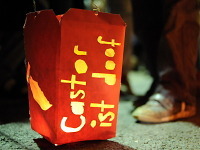 A police spokesman said a demo by about 250 nuclear opponents was peaceful. The Southwest German Anti-Nuclear Initiatives criticise the transport as “senseless and dangerous”. They say the CASTORS contain 16 kilograms of plutonium and more than 500 kilograms or uranium. The first part of the trip would be on tram lines through several residential districts.
A police spokesman said a demo by about 250 nuclear opponents was peaceful. The Southwest German Anti-Nuclear Initiatives criticise the transport as “senseless and dangerous”. They say the CASTORS contain 16 kilograms of plutonium and more than 500 kilograms or uranium. The first part of the trip would be on tram lines through several residential districts. Calls are out for rallies and vigils in Karlsruhe on Tuesday night. Police have banned gatherings in a corridor 50 metres either side of rails along the transport route.
Eichenberg (south of Göttingen)
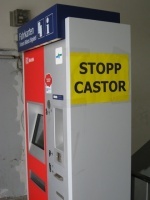 A handful of Göttingers set out for Eichenberg to protest and to inspect rail track along the possible route. They hung placards and a banner visible to all travellers in the railway station, then enjoyed the falling snow in a little winter walk in and around the Eichenberg rail triangle.
A handful of Göttingers set out for Eichenberg to protest and to inspect rail track along the possible route. They hung placards and a banner visible to all travellers in the railway station, then enjoyed the falling snow in a little winter walk in and around the Eichenberg rail triangle. 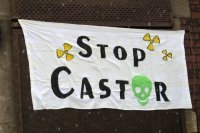
About 20 in Ludwigslust
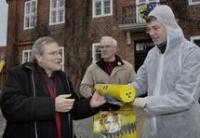 About 20 protesters gathered outside the Ludwigslust town hall. The CASTOR train is to run through the small town. The demonstrators’ yellow placards read “Stop Castor” and “Nuclear Power – No Thanks”. The action was part of a campaign "Five to 12” that ran in the states Mecklenburg-West Pomerania, Brandenburg, Saxony-Anhalt and Lower Saxony.
About 20 protesters gathered outside the Ludwigslust town hall. The CASTOR train is to run through the small town. The demonstrators’ yellow placards read “Stop Castor” and “Nuclear Power – No Thanks”. The action was part of a campaign "Five to 12” that ran in the states Mecklenburg-West Pomerania, Brandenburg, Saxony-Anhalt and Lower Saxony.
Just before noon the demonstrators handed a “radiation dose” to Mayor Reinhard Mach. Senior high school student Erik Nowe handed over a yellow cardboard roll replete with nuclear symbolism. It contains a document of questions to the mayor and town other representatives. "We ask ourselves above all, what the town intends to do to protect its citizens from an accident and whether it is informed about the disaster protection concept of the county,” said Ludger Klus, a coordinator of the action. Erik, who is active in the Greens your organisation, said it was important for him to express his criticism of CASTOR transportation. “I live in Dömitz, not far from Gorleben, where I’ve been active in the protests for years,” said the 18-year-old. He wished that people were more aware of the issue. "In Mecklenburg there are far too many people who very definitely don’t grapple enough with this topic,” Erik said. Mayor Mach was puzzled by the choice of location for the officially approved demo. "I’m wondering a bit why the action is taking place outside the town hall,” he said, because this suggested a responsibility that didn’t exist. “Legally there is nothing the town can do about the CASTOR transport,” Mach stressed. He strenuously rejected expectations of “omni-responsibility”. Ludger Klus emphasised that the location was deliberately chosen: “We demand that the two representatives address this problem.”
From a distance of about 20 metres, two agents of the state protection authority observed the action from their car. "I wouldn’t have imagined state protection being interested in us,” Ludger Klus was surprised. It was established that the agents belong to a “mobile extremism investigation” unit, a group in the state protection agency. A police spokesman emphasised that there was nothing to suggest extreme activities by the Ludwigslust CASTOR protesters. “This is merely information gathering work,” he said. Mayor Mach commented drily: “They’re not allowed to stop there, parking is prohibited there.”
Police cite 50 in Halle
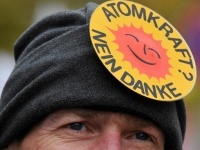 Police cited 50 protesters assembled in the pedestrian zone. There were no incidents. The Halle Anti-Nuclear Initiative had announced its intention to inform people about the incalculable risks of the consignments.
Police cited 50 protesters assembled in the pedestrian zone. There were no incidents. The Halle Anti-Nuclear Initiative had announced its intention to inform people about the incalculable risks of the consignments.
Calls of "Switch off atomic power!", "Castor Stop!" rang through Rostock from a peaceful demonstration started by about 100, but growing to 150 and ultimately 300. Among them were families with children, members and politicians of The Greens and The Left as well as youth organisations. All braved a storm and rain as they moved through the inner city to loud music, speeches and chants. It all took about two hours.
Attention was not focussed exclusively on the imminent waste delivery, but also police documentation published in December about trhe delivery that month. The police paper alleges that Rostock activists are potentially highly violent – although neither in December nor now there were no violent actions.
Dozens in Brandenburg
 Dozens participoated in protest actions at several locations in Brandenburg state. The CASTOR train is expected to run through it. The one in December went through the Prignitz area in the northwest of the state.
Dozens participoated in protest actions at several locations in Brandenburg state. The CASTOR train is expected to run through it. The one in December went through the Prignitz area in the northwest of the state.
Some of the protest actions were organised by an alliance formed only a week prior, the “Anti-Atom-Bündnis Teltow-Fläming”. Initiator Sven Baranowski was satisfied with the turnout given the short run-up time.
In Zossen about 50 people attended a midday rally. In the market square the activists had placed among others Chancellor Angela Merkel as an almost life-size effigy for people rail against her government’s nuclear energy policy.
Several dozen participants were also reported at rallies in Diedersdorf, Blankenfelde and Jüterbog. There were also protests in Bernau, Biesenthal and Eberswalde. In Wittenberge there was an info event the whole morning.
Church bells to peal in Wismar
The church congregation St. Marien-St. Georgen in Wismar invites parishioners to prayers against nuclear policy on 14 February. “Those responsible in politics and the energy industry have not found and set up a safe repository for highly radioactive waste. We fear a creeping inurement to a Lubmin final repository in Mecklenburg-West Pomerania. To spare our children and grandchildren and many generations the radioactive burden we would leave this way, we campaign for an end to nuclear energy,” said Marie-Anne Schlaberg of the congregation council.
There are also to be prayers for a liveable future in the St. Nikolai Church at 6 p.m. Monday before the arrival of the CASTOR train in Lubmin.
Berlin unfortunately a bit asleep...
...in regard to anti-nuclear action. Pity! Especially the many who went to Gorleben in November either don’t have a clue, are exhausted or too lethargic, though Greifswald is really worth supporting. If about 300 action-oriented Berliners were to travel north the next few days and do some strong decentralised actions, it would be really super and effective. But no, after the L14 protests (which were quite good on the whole) and between Dresden, there seems to be hardly any potential in the radical left spectrum. Dumb, actually, because in the north Nazis are trying to run after or kidnap the anti-nuclear movement because they rightfully fear it because it has been traditionally anchored left, which is not only ecologically good for Mecklenburg-West Pomerania, but also good in human terms because it’s anti-fascist and colourful.
Anyway, perhaps a few in addition to the usual anti-nuclears will get involved. Switchg off the nuclear industry!
Atomindustrie Abschalten!
About 25 in Magdeburg city centre
About 25 activists drew attention to the imminent delivery in the city centre.
http://de.indymedia.org/2011/02/300313.shtml
The CASTOR delivery may roll through Barnim. The Barnimer Anti-Castor Aktionsbündnis organised a rally at Bernau station at which attention was drawn by speakers to the local connections with power companies. Ems-Weser-Elbe Energie Konzern owns 26% of EnBW, meaning it will receive a large share of the EWE profits, thereby directly enriching the nuclear lobby. EnBW owns four nuclear power stations and the imminent waste delivery comes from one of them, Karlsruhe. That makes EWE a good protest target. 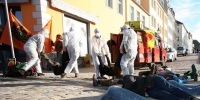 At noon the rally participants took a train to Biesenthal for a rally outside the local EWE base. Lively participation by locals took the number to 60 anti-nuclear, pro-renewables protesters.
At noon the rally participants took a train to Biesenthal for a rally outside the local EWE base. Lively participation by locals took the number to 60 anti-nuclear, pro-renewables protesters.
The protesters moved on their next location, the EWE service base on the Eberswalde market square. EWE vehemently opposes green power, having litigated at the European Court of Jutsice against the Renewable Energy Act. It is therefore imperative to draw people’s attention to this company policy and stir them to switch to green power to drive change at last.
On the Eberswalde marketplace a small street theatre took place with activists symbolically falling over dead as radiation victims and being removed by a nuclear disposal squad. Speeches were held and music was played.
Altogether about 180 people turned out in Bernau, Biesenthal and Eberswalde. They had banners, nuclear waste drums and other things to draw attention to the imminent delivery so that it cannot pass uncriticised.
Resistance actions are to continue in the coming days when the CASTORS will roll. The Barnim alliance is calling for vigils and many other, varied actions. Central information points will be the post office at Bernau railway station, the station building in Biesenthal and in Eberswalde probably the Exil.
Actions will also take place directly by the railway line along the route. There are to be flash mobs and so-called rail checks, in which activists will go directly to the track and with their presence force the train to slow down or stop. The aim is to drive up the transportation costs to make the senselessness of them clear.
We call on everyone to take part in these protests and to jointly set markers against the government’s nuclear policy, which serves only to maximise corporation profits and gives no consideration to people and nature.
The Barnim Anti-Castor Action Alliance comprises representatives of Dosto Bernau, the Aktionsgruppe Stopp Castor Biesenthal, Greenpeace, the left youth ‘solid' and the Left Action Group Eberswalde.
http://linkeaktionew.blogsport.de
Danger from unexploded ordnance
The Contratom alliance says on one of the potential routes approved by the authorities close to Berlin and through Oranienburg the CASTORS could be endangered by lots of unexploded World War II ordnance. Contratom says already during last year’s consignment the mayor of Oranienburg, Hans-Joachim Laesicke, had warned that ground vibrations could detonate world war munitions.
Police numbers rising
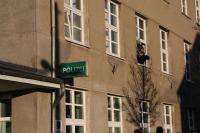 Police presence, including plainclothes, has increased significantly in Rostock and surrounds. The Greifswald demo on Saturday was copiously filmed and photographed from the police station.
Police presence, including plainclothes, has increased significantly in Rostock and surrounds. The Greifswald demo on Saturday was copiously filmed and photographed from the police station.
http://manfred.blogsport.de/2011/02/13/achtung-repression/


